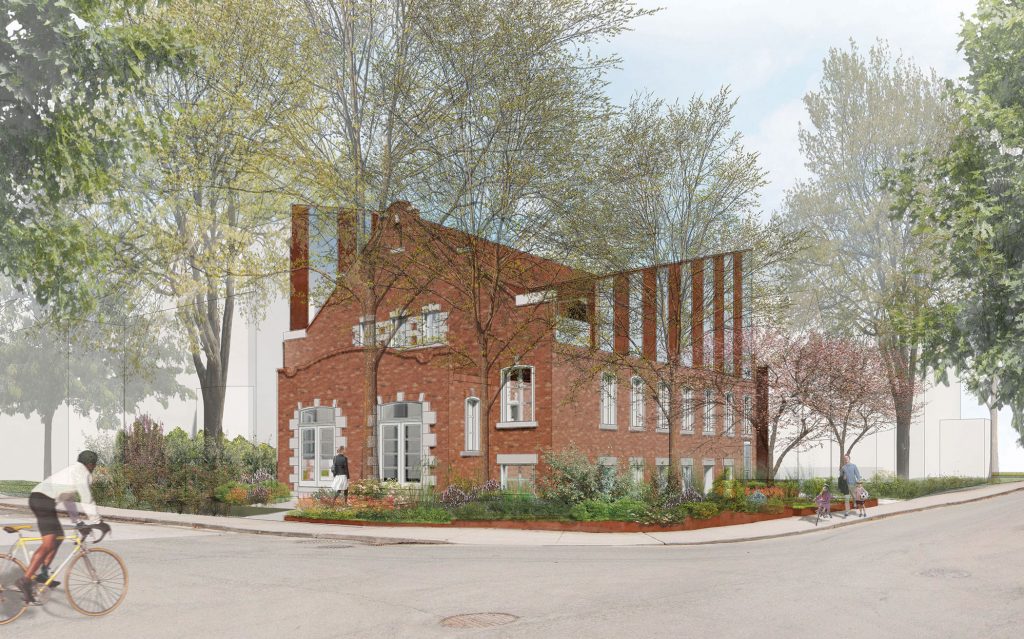Developer seeks “middle ground” to resolve dispute with neighbour

By Madeline Smart
The approved development plan for the one-time synagogue at 225 Brunswick Ave., whose plan required nine bylaw variances, has been appealed by a nearby neighbour.
After a virtual hearing in March, the Committee of Adjustment (CoA) made the decision to approve the variances requested by the developers plan on April 6 on the condition that no other variances were made.
By April 30th, neighbour Simon Wynberg had filed his appeal. In that appeal he represents 30 other residents within a 60 metre radius of the development.
The appeal restates the multiple variances of the proposed development that do not meet the city’s zoning standards in an attempt to have the plan’s approval reconsidered.
Some of the variances include not providing parking for future residents, no waste enclosure, decreasing the natural landscaping, possibly damaging some trees and most importantly to Wynberg, a proposed density that is 3 times larger than what is usually permitted.
“Our sticking point has always been the volume,” said Wynberg. “It’s just out of proportion.”
Developer Jeff Kopas said they have adjusted their plans to include waste storage, added parking for bikes, and received support from transportation services.
However, Kopas says only so much can be done about the density because renovating an older building is already expensive.
“To convert this building to residential is extremely cost prohibitive,” said Kopas in an emailed statement. “We are absolutely willing to do what we can, but it has to be reasonable.”
According to the developments’ website, they had looked into creating fewer units which may have reduced the density but it “wouldn’t have covered the hard and soft costs associated with renovating this structure.”
In order to turn the current two and a half storey building into three storeys with seven apartment units, the plan is to increase the building depth by five metres more than the permitted maximum depth. The plan also increases the floor space to over three times the area of the lot due to the addition of the third floor, when the applicable bylaw states it should only be one time the size.
Overall the community isn’t opposed to 225 Brunswick Ave. being turned into a residential building, but some just wish it were being done differently.
Another resident, Margaret Zeidler, prominent city builder, and President and creator of 401 Richmond Limited, is worried that that the development will set a harmful precedent for the neighbourhood as well as older buildings in the city.
“Yes it is an unusual development but it’s not unusual in the way it faces someone’s backyard,” said Zeidler. “And if they’re allowed to do that then why isn’t the next guy allowed to do it?”
Though 225 Brunswick Ave. was never officially designated as a heritage building, Wynberg wishes it would be treated with similar respect. “Nobody is objecting to it being housing, we would just like to see proper treatment of a heritage building,” said Wynberg.
Originally a gospel mission hall in 1911, the building went on to become a synagogue that hosted one of Toronto’s oldest Jewish Orthodox communities in the 1930s. It has long since become a commercial building but the character and history still remain.
However, Anne Fleming who is chair of the Harbord Village Residents’ Association (HRVA), says that 225 Brunswick Ave. will not set any precedent for the area. “225 was an absolute anomaly, it’s a completely unique situation,” said Flemming. “It’s a unique building to the neighbourhood and so whatever happens here is not a precedent for anything else.”
Kopas was disappointed to hear about the appeal, stating that he believed his company had done their best to work with the community. “This is an incredibly challenging building and we have been working on finding a proposal everyone could support for over three years now,” said Kopas.
According to Kopas, the building hasn’t had a legal use as a commercial building since the 1980s and was only being used as one conditionally because the previous owners could not afford to renovate it into a residential unit. So Kopas will keep fighting for their plan if the appeal is approved, because they don’t have another option. They hope to find a middle ground with the neighbours that makes everyone happy.
Wynberg and the other neighbours he represents for the appeal are still open to negotiations and finding a middle ground with Kopas, but for now they are taking the legal steps and hoping to see the process take place fairly.
The virtual hearing for the appeal is set for August 24.
READ MORE:
- FOCUS: Community concerned over 225 Brunswick Ave. plan (Mar. 2021)
